Félix Bonfils
Félix Adrien Bonfils (8 March 1831 – 1885) was a French photographer and writer who was active in the Middle East. He was one of the first commercial photographers to produce images of the Middle East on a large scale and amongst the first to employ a new method of colour photography, developed in 1880.
Félix Bonfils | |
|---|---|
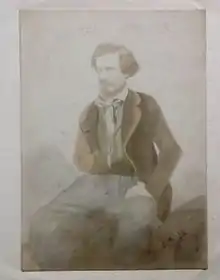 Félix Bonfils, self-portrait | |
| Born | Félix Adrien Bonfils 8 March 1831 Saint-Hippolyte-du-Fort, France |
| Died | 9 April 1885 (aged 54) Alès, France |
| Nationality | French |
| Occupation | Photographer and publisher |
| Years active | especially from 1867 to his death |
| Known for | early Middle East photography |
| Spouse(s) | Marie-Lydie Cabanis (1837-1918) (m. 1857) |
Life and career
He was born in Saint-Hippolyte-du-Fort and died in Alès. Félix worked as a bookbinder but in 1860 he joined General d'Hautpoul's expedition to the Levant. Soon after returning from Lebanon he became a photographer.
In 1857, he married Marie-Lydie Cabanis. When his son, Adrien, fell ill, Félix remembered the green hills around Beirut and sent him there to recover, being accompanied by Félix's wife.[1] The family moved to Beirut in 1867 where they opened a photographic studio called "Maison Bonfils".[2][3]
Maison Bonfils produced thousands of photographs of the Middle East. He worked with both his wife and his son. Their studio became "F. Bonfils et Cie" in 1878. They photographed posed scenes, dressed up in Middle Eastern regalia, and also stories from the Bible.[2] Bonfils took photographs in Lebanon, Egypt, Palestine, Syria, Greece and Constantinople (now Istanbul).[3] While Bonfils produced the vast majority of his work, it is known that his wife, Lydie also made some of the studio portraits, especially those of Middle Eastern women, who were more inclined to pose for a female photographer.[4]
Bonfils was amongst the first photographers to employ the new technique of Photochrom, a photographic colour printing technique, developed in 1880. [5] Maison Bonfils was one of the most prolific studios in the Middle East in the late 19th-century. [6]
Work

After settling in the Near East, Bonfils took some panoramic photographs of Constantinople and Damascus.[7] His work became well known among the tourists that travelled to those countries because they bought photographs as souvenirs. In 1872 he published the album Architecture Antique (by Ducher press) after presenting some of his pictures to the Société française de photographie. He later re-opened a studio in Alès (France) from which he would publish Souvenirs d'Orient; his best-known work. [8]
Select list of publications
- Bonfils, F., Architecture antique : Égypte, Grèce, Asie Mineure, 1872
- Bonfils, F., Catalogue de vues photographiques de l'Orient, 1876
- Bonfils, F., Souvenirs d'Orient, 1878
- Bonfils, F. (with Adrien & Lydie Bonfils), Photographs of the Middle East, circa 1860s-1900s
Selected photographs
_-_613_-_Joueurs_de_violon_bedouins.jpg.webp) Bedouin Violin Players, c. 1880
Bedouin Violin Players, c. 1880_-_766_Gardien_du_tombeau_des_rois_et_sa_famille.jpg.webp) Guardian of the Tomb and his family, c.1880
Guardian of the Tomb and his family, c.1880_-_Femmes_de_Silo%C3%A9%252C_Palestine_-_Google_Art_Project.jpg.webp) Women of Siloé, Palestine, c. 1880
Women of Siloé, Palestine, c. 1880 Road to Bethlehem, c. 1880
Road to Bethlehem, c. 1880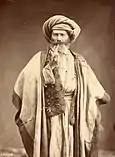 Arab man with a pipe, 1880s
Arab man with a pipe, 1880s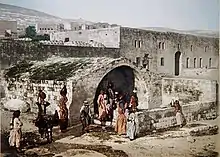 Well of St. Mary, Nazareth, 1880s
Well of St. Mary, Nazareth, 1880s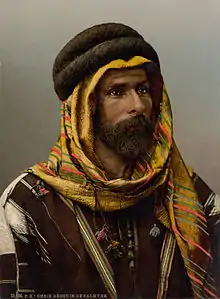 Bedouin Chief of Palmyra, photochrom, 1880s
Bedouin Chief of Palmyra, photochrom, 1880s Bedouin mothers carrying their children, photochrom, 1880s
Bedouin mothers carrying their children, photochrom, 1880s_-_682._Chef_de_bedouins_pasteurs.jpg.webp) Chief of the Bedouin shepherds, 1880s
Chief of the Bedouin shepherds, 1880s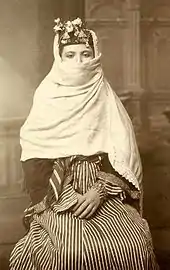 Woman from Nablus, between 1867 and 1885
Woman from Nablus, between 1867 and 1885
References
- Hannavy, J., Encyclopedia of Nineteenth-Century Photography, Routledge, 2013, p. 173
- "Aerial Panoramic View of Beirut". World Digital Library. Retrieved 21 January 2013.
- Szegedy-Maszak, Andrew (May–June 2001). "The Genius of Félix Bonfils". Archaeology. 54 (3).
- Hannavy, J., Encyclopedia of Nineteenth-Century Photography, Routledge, 2013, p. 174
- Farbige Reise, Paris bibliothèques, 2009, p. 41
- Vogelsang-Eastwood, G., For Modesty's Sake? Barjesteh, Meeuwes & Company, 1996, p. 163
- "Collections Search Center, Smithsonian Institution". Collections.si.edu. Retrieved 20 October 2013.
- Hannavy, J., Encyclopedia of Nineteenth-Century Photography, Routledge, 2013, p. 173
External links
| Wikimedia Commons has media related to Félix Bonfils. |
Further reading
- Carney, G., The Image of the East: Nineteenth-Century Near-Eastern Photographs by Bonfils,[From the Collection of the Harvard Semitic Museum], Chicago/London. University of Chicago Press, 1982
